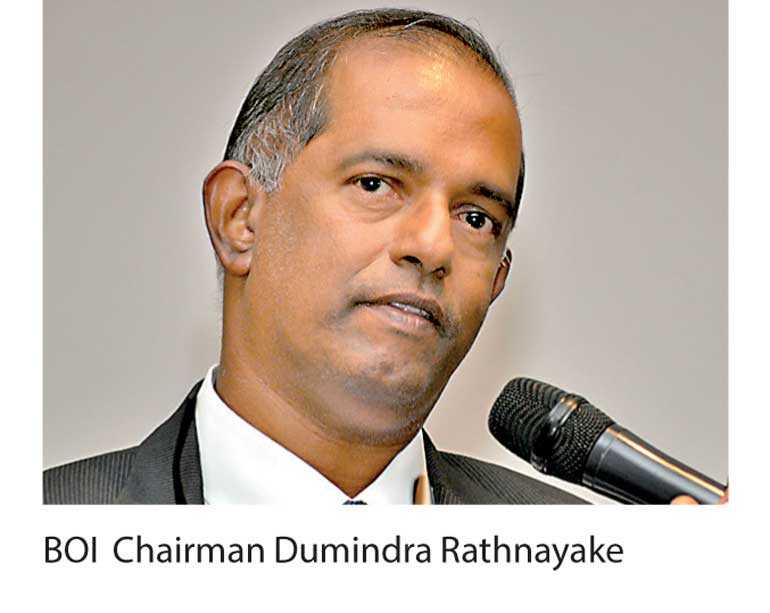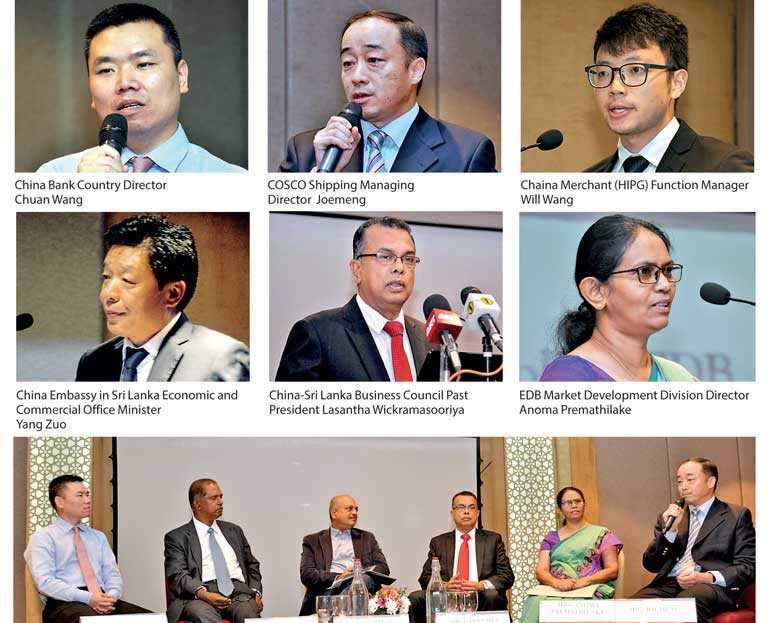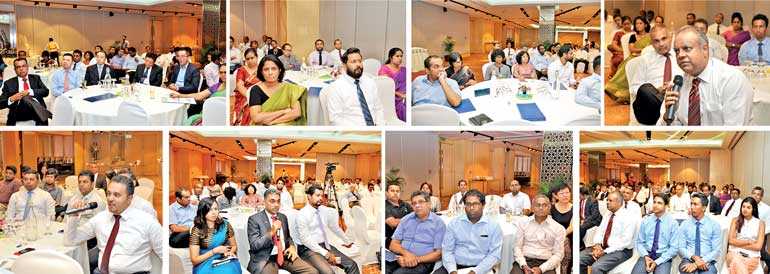Thursday Feb 19, 2026
Thursday Feb 19, 2026
Wednesday, 20 June 2018 00:00 - - {{hitsCtrl.values.hits}}


 By Maleesha Sulthanagoda
By Maleesha Sulthanagoda
In a fresh bid to enhance exports to China and attract investment, industry professionals gathered for a discussion last week organised by the Sri Lanka-China Business Council (SLCBC) of the Ceylon Chamber of Commerce.
Investment opportunities, attracting Chinese investors, marketing opportunities in China, entry strategies to the Chinese market, handling business with Chinese partners and market facilitation by the Export Development Board (EDB) were some of the key topics discussed at this event.
The speakers of this gathering were the Embassy of People’s Republic of China Minister of Economic and Commercial Office Yang Zuo Yuan, Export Development Board Director of Market Development Anoma Premathilake, China Merchant Group Function Manager Will Wang and Sri Lanka-China Business Council Immediate Past President Lasantha Wickremasooriya.
The Chinese Embassy’s Minister of Economic and Commercial Office Yang Zuo Yuan spoke on marketing opportunities in China and entry strategies into the Chinese markets.
“Firstly, exploring potential products or services with Sri Lankan characteristics and highlighting their special aspects is important. Now many companies from all over the world are in China. To stand out from those competitors, you must have a clear idea about what differentiates your product from others. Companies should have more efforts put into creating good reputation in the Chinese market, strengthening brand awareness. Secondly, improving the quality of the products. Chinese people now have higher expectations for what is offered and companies have to set high standards for their products to better meet the changing needs of the Chinese people. This will assist in appealing to the large middle-class group that is emerging in China. They have a large emphasis on the quality, personal traits and diversification of products. Thirdly, expansion of production capacity. Sri Lanka has traditional trade partners, China is at a lower rank compared with these countries in terms of the value of goods and services exported from Sri Lanka. With a large population, China holds a huge market but the problem is that there is a shortage of Sri Lankan products, goods and services to be exported to China. Fourthly, taking full advantage of various platforms. Especially the e-Commerce platforms like alibaba.com. This will also improve brand awareness and increase the potential target markets,” he added.
He also went on to highlight recent developments in the Chinese economy and how that would influence marketing opportunities for Sri Lankan exporters.
“Over the past years, the Chinese economy has maintained a median high growth rate. China ranks as a market leader among the major countries with GDP rising to $12 trillion. China has maintained its position as the second largest economy and contributed more than 30% of global economic growth. As for the consumer market, in the year 2017, final consumption contributes 58.8% to economic growth. In terms of how this would affect Sri Lanka, tourist arrivals from China reached 270,000, contributing to the development of the tourism sector of the country. In recent years more and more Chinese companies have also come to invest in Sri Lanka. China has become one of the important sources of FDI for Sri Lanka. Compared with that, there is a relatively small number of Sri Lankan enterprises investing in China also,” he elaborated.
Speaking on investment opportunities and how to attract Chinese investors, Hambantota International Port Group Function Manager Will Wang stated that there needs to be improvements to port development-related industry policies.
“Sri Lanka needs a specific policy to support the development of the port-related industry at the Hambantota Port or even in Sri Lanka. As an investor, you have specific requirements that need to be met. When you invest in some place it should have a clear policy,” he added.
According to Wang, the locale of Hambantota lacking reliable infrastructure facilities is also an inhibitor of potential future investments.
“From the investors’ point of view the power and water sectors are particularly challenging in the Hambantota area. For investors, they need an uninterrupted water and power supply to meet their requirements but now when they come to the Hambantota port we cannot promise them reliable utilities,” he further elaborated.
He stated that if these aspects were improved, more investors and FDI would flow into the country. Wong also proposed constructing significant incentive programs and packages so that investing in Sri Lanka would be more appealing to future investors.
In December 2017 the concessional agreement with respect to the Hambantota port was signed between CMPort and the Sri Lankan Port Authority. China Merchants Group is the holding company of China Merchants Ports which was founded in 1872. The company set up the very first merchant fleet in China. Hambantota port which is located only 10 nautical miles from the global trade route. Hambantota International Port Group is the single largest port in Sri Lanka. It is a vital location of China Merchant Ports portfolio of over 52 marine terminals across five continents. A subsidiary company, Hambantota is a national port service company a joint venture of HIPG and Sri Lanka Port Authority. It is responsible for providing security, navigation and other facilities within the port. We are now working together to ensure the efficiency and reliable moving of all cargo inside the port. In the future, the port related industry will be developed in Hambantota, making it a comprehensive import port in South Asia. In the coming years we are going to operate in five different businesses in the Hambantota port. Port operations, marine services, port related industry and as an investment incubator are in these five businesses. Currently Hambantota port has been able attract many potential foreign investors and have received some proposals from many local and international investors. At present Hambantota port and HIPG work as closely as possible with all potential local and international investors to obtain required approvals and also to sign agreements. The port related industry will be put into action in the near future. As more investors visit this port, their requirements also become very clear.
EDB Director of Market Development Anoma Premathilaka spoke on the role of the EDB in developing exports to China by increasing market facilitation.
“If we look at the trading partners, our first export destination is the US. Nearly $3 billion worth of goods and then the UK, India, Germany, Italy and finally China. China has become the sixth largest export destination with nearly $400 million. It is a big achievement compared with the position of China on the list a few years back. On the import side, while India is our biggest importer a close second is China with nearly $4 billion worth of imports. Our main export products to China are apparel, tea, rubber, coconut and spices but there is also a lot of competition in these markets. To increase our exports, the EDB is conducting various ventures so that Sri Lankan exporters are better equipped to handle competition. These ventures include capacity-building programs, trade facilitation, enterprise development support schemes, trade fairs and exhibitions. We also provide training in export procedures and operational aspects to create the next generation of local entrepreneurs to enter the export markets,” she asserted.
SLCBC Immediate Past President Lasantha Wickremasooriya spoke on the aspects of doing business with Chinese partners.
“The role that culture influences the negotiations is immense in China. It is important to understand the cultural nuances when doing business in China. In most cases the cultural and language barrier is why negotiations fail. Patience and taking a niche approach when doing business with Chinese partners is utterly important,” he added.
The event also included a panel discussion moderated by Daily FT Editor Nisthar Cassim, to share their perspectives on improving exports to China and attracting investments to Sri Lanka.
The panel consisted of the Board of Investment (BOI) Chairman Dumindra Ratnayaka, Bank of China Country Manager Chuan Wong, COSCO Shipping Lines Managing Director Joe Meng along with EDB Director Market Development Anoma Premathilake and SLCBC Immediate Past President Lasantha Wickremasooriya.
Panel discussion:
Q: What is the status quo in terms of investments from China?
A: BOI Chairman Dumindra Ratnayaka: We have several large investment projects that are now coming to us from China or with local and Chinese collaborations. Bigger ones include the Colombo Port City, the Hambantota port and subsequently the recent LNG Plant that’s coming near the Hambantota industrial zone. This is happening because countries like China have recognised the value of Sri Lanka’s strategic location.
Q: Is China the No.1 investor as of now or do you feel that going forward, at the end of this year China will be No.1?
A: BOI Chairman: It depends on the investment. But as of now as a country in the short term, the last one or two years, China is the leading investor. During the first four months of 2018 BOI signed agreements with an investments totalling $1.38 billion. That is combining both the local and foreign components.
Q: As BOI Chairman, would you vouch that these investment figures are correct?
A: BOI Chairman: Yes, in 2017 Sri Lanka attracted $1.7 billion as per BOI assessment. The Central Bank figure of % 1.9 billion includes non-BoI companies as well.
Q: Can the Bank of China explain its outlook for
Sri Lanka?
A: Bank of China Country Manager: Now according to profits we are the 4th biggest commercial bank in the world. More and more Chinese companies are interested in our opinion. There are 62 big Chinese SOEs already in Sri Lanka and 26 of the SOEs are Fortune Global 500 companies. Many of these SOEs have also placed their regional headquarters in Sri Lanka to cover any other South Asian countries. Our branch will cover Maldives, Bangladesh and Nepal for business. That is why we chose Sri Lanka to be one of our headquarters in South Asia.
Q: EDB is said to be developing a China market entry strategy. Can you expand?
A: EDB Director of Market Development Anoma Premathilaka: The strategy I mentioned is a new one, we reported in our action plan to get a consultant to come up with a new strategy other than the normal activities we engage in.
Q: Did you have a strategy before on China?
A: EDB Director of Market Development Anoma Premathilaka: In 2008, Sri Lankan exporters were not thinking about the Chinese market as a possible market for us. We were thinking about it only as a sourcing destination, but from then onwards we have done some research. We have distributed those research papers to the China business council and other related institutions. We have slowly developed this market for Sri Lankan companies. At the very beginning, in the Kunming Fair, the stalls were given free of charge. We have to introduce them by giving them air fare as well. That’s how we promoted Sri Lankan companies to go there. This slowly picked up pace and there were a lot of companies interested in attending various events of the fair too. So we are happy that the strategy we used actually helped SMEs to get into the market and to increase the amount of exports to China.
Q: Does the EDB have
different country strategies like this?
A: EDB Director of Market Development Anoma Premathilaka: We have a strategy paper for each country. We have analysed what the most potential products are, what the product market combinations and so on.
Q: Does the EDB get involved in the FTA negotiations, do they support the FTA
negotiations?
A: EDB Director of Market Development Anoma Premathilaka: Yes we support the FTA negotiations. We work on behalf of the exporters, gather their concerns, analyse what the potential products are and request tariff concessions during these negotiations.
Q: In terms of joint ventures (JV), how interested are Chinese entrepreneurs in forming joint ventures or do they prefer total ownership with any country they are working with?
A: COSCO Shipping Managing Director Joe Meng: It’s based on the regulations, because there are some restrictions on different kinds of businesses. I think all the foreign investors must obey the local rules; that is most important. But if the condition is okay, then it will depend on what the requirement will be for the JV to be successful project. That means to run a successful project, it requires a lot of things. From the cost side, technology side and from the HR side. The foreign investor must come and see how the partner can contribute to the JV to get the best results.
Pix by Lasantha Kumara